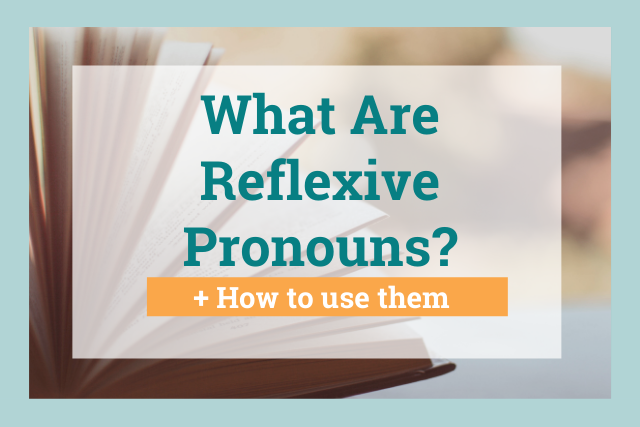
What are reflexive pronouns, and when do you need to use them?
The short answer is that a reflexive pronoun is a pronoun that ends in -self or -selves.
There are many specific rules when it comes to using reflexive pronouns, and it can be confusing to figure out how to use them correctly.
If you’re looking for a guide, you’ve come to the right place. This article will explain what reflexive pronouns are, how to use them, and how to avoid common mistakes.
What Is a Reflexive Pronoun?
In English, the singular reflexive pronouns are myself, yourself, herself, himself, and itself.
The plural reflexive pronouns are ourselves, yourselves, and themselves.
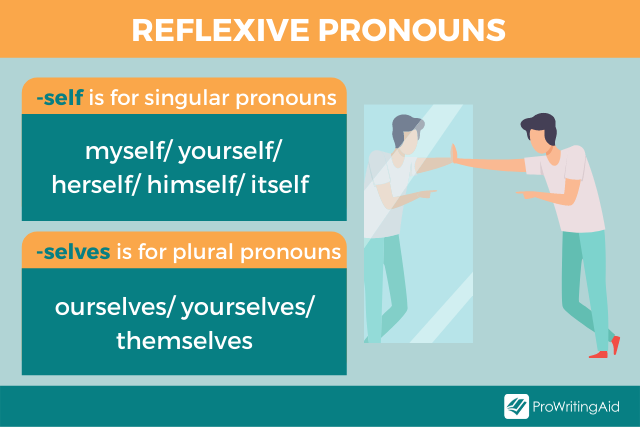
You use reflexive pronouns when the subject of a sentence is also the object of the sentence. This way, you can explain what’s happening without having to repeat the same subject twice.
For example, you might write the sentence Miranda smiled at Miranda in the mirror, where Miranda is both the subject and the object. This sentence is grammatically correct, but it sounds clunky and repetitive, and it also leaves room for error because there might be two Mirandas in the room.
To improve the sentence, you can replace the second “Miranda” with a reflexive pronoun: Miranda smiled at herself in the mirror. The reflexive pronoun here tells us that Miranda is directing the smile at Miranda, in a smoother and clearer way.
When Should You Use Reflexive Pronouns?
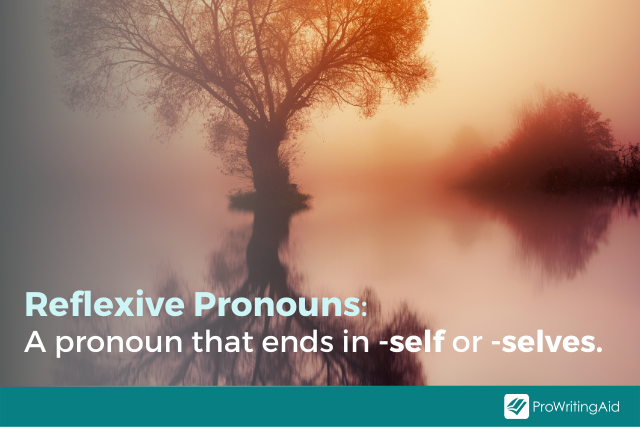
There are many specific circumstances in which we use reflexive pronouns. Let’s take a look at each of them.
Use Reflexive Pronouns When the Subject and Object Are the Same
The most common way to use a reflexive pronoun is when the subject of a sentence is also the object of the sentence.
Examples:
- John kicked himself when he realized he’d messed up means “John kicked John”
- Joanna pinched herself to see if she was dreaming means “Joanna pinched Joanna”
- You shouldn’t blame yourself for what happened means “you shouldn’t blame you”
Use Reflexive Pronouns as Intensive Pronouns
You can use a reflexive pronoun immediately after the subject to make it an intensive pronoun.
The purpose of intensive pronouns is to emphasize the subject of the sentence and draw additional attention to who they are.
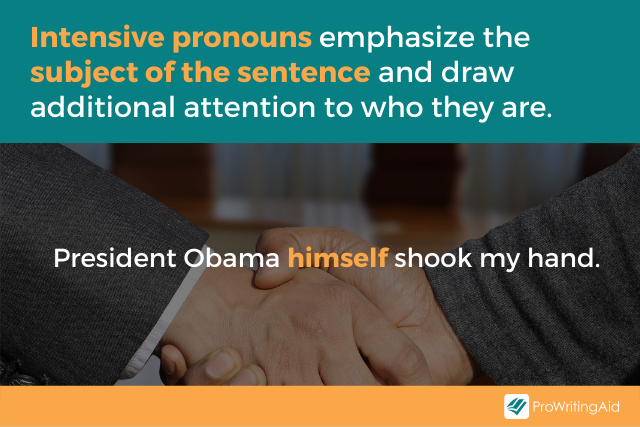
Examples:
- The Queen of England herself attended my daughter’s graduation emphasizes the importance of the Queen of England
- President Obama himself shook my hand emphasizes the importance of President Obama
- I myself have always preferred chocolate over butterscotch emphasizes the person who’s speaking
Use Reflexive Pronouns to Mean “Alone” After the Preposition “By”
You can use a reflexive pronoun after the preposition “by” to show that someone is doing something alone, or without any help from other people.
Examples:
- My daughter has finally learned how to get dressed by herself means “My daughter has finally learned how to get dressed without anyone else’s help”
- He cleaned the bathroom by himself means “He cleaned the bathroom without anyone else’s help”
- I ate at the restaurant all by myself means “I ate at the restaurant alone”
Use Reflexive Pronouns to Mean Specific Things with Specific Reflexive Verbs
Some verbs change their meaning when you add a reflexive pronoun. There are no general rules for these, so you simply have to memorize what they mean.
- Help yourself means “take as much as you want”
- Behave yourself means “behave well”
- Apply yourself means “work very hard”
- Content yourself means “be satisfied”
Before we take a look at common reflexive pronoun mistakes, let's review what we've learned so far:
When Are Some Common Mistakes When Using Reflexive Pronouns?
Many writers mistakenly use reflexive pronouns in cases when they should use a normal pronoun instead.
Let’s talk about some of these common mistakes.
Don’t Use Reflexive Pronouns in a Compound Subject or Compound Object
Many people, especially in business settings, will make the mistake of using reflexive pronouns when there are multiple subjects or objects in the sentence.
In these cases, you should actually use the same pronouns you would use if you have only one subject or object.
Here are some examples of this mistake:
- Mr. Pera and myself are proud to present our new project (Correct version: Mr. Pera and I are proud to present our new project)
- You can ask questions to Katy or myself (Correct version: You can ask questions to Katy or me)
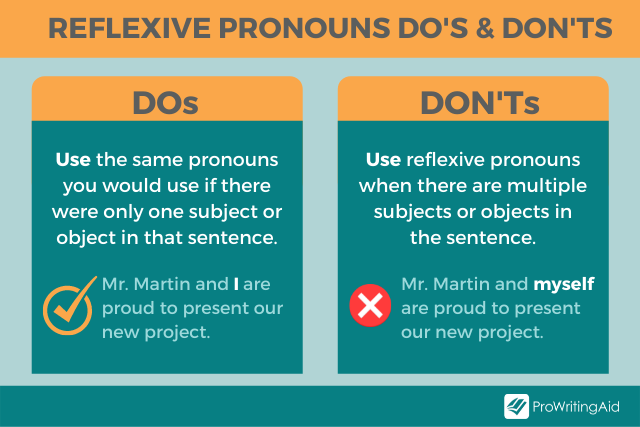
Don’t Use Reflexive Pronouns After Prepositions of Place
Don’t use reflexive pronouns after prepositions related to place, such as in front of, behind, near, above, below, or beside.
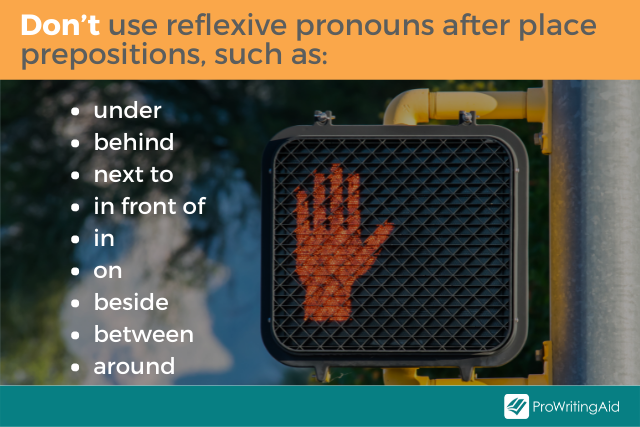
Here are some examples of this mistake:
- The dog barked at the squirrel beside itself (Correct version: The dog barked at the squirrel beside it)
- I looked out the airplane window at the clouds below myself (Correct version: I looked out the airplane window at the clouds below me)
Don’t Use Reflexive Pronouns After the Preposition “With”
Here are some examples of this mistake:
- She had her family with herself (Correct version: She had her family with her)
- He brought a guitar with himself to the audition (Correct version: He brought a guitar with him to the audition)
Don’t Use Reflexive Pronouns if the Reflexive Verb Is Something People Normally Do for Themselves
You don’t need a reflexive pronoun with reflexive verbs that describe something that a person normally does for themselves, because in that case, the reflexive pronoun is implied.
Here are some examples of this mistake:
- He shaved himself every morning (Correct version: He shaved every morning)
- I dressed myself for the party (Correct version: I dressed for the party)
We only add a reflexive pronoun after these verbs to emphasize the fact that it’s being done.
- He shaved himself every morning, even when he was too weak to hold the razor.
- I dressed myself for the party though my stylist wanted to do it for me.
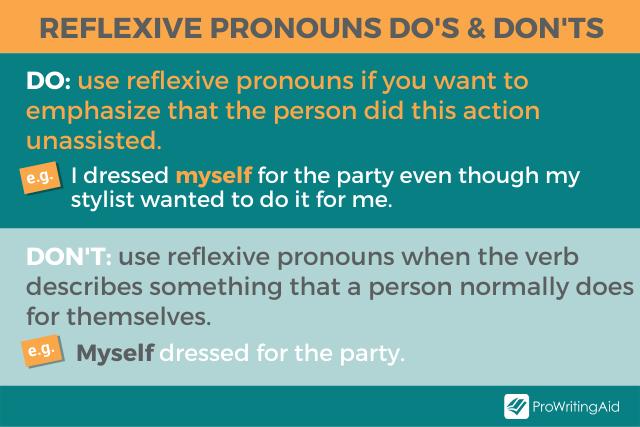
Using pronouns and reflexive pronouns helps your reader follow who is doing what. But using them too frequently makes your writing feel dull or repetitive, especially at the beginning of sentences.
ProWritingAid's Pronouns Report highlights all of the pronouns in your document so you can make sure they are all necessary. Aim to have pronouns make up under 15% of all words in your document.
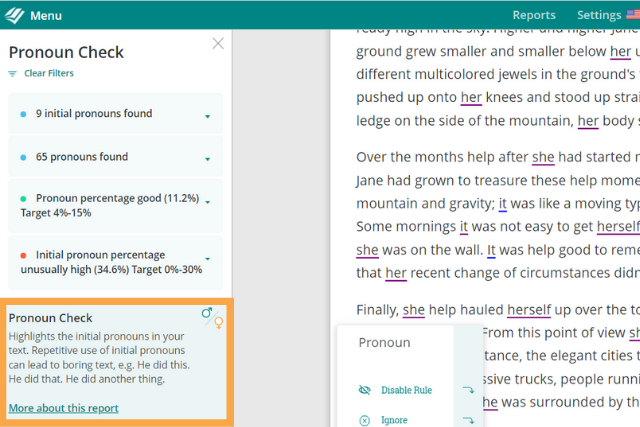
Try the Pronoun Report with a free ProWritingAid account.
What Are Some Examples of Reflexive Pronouns Used in a Sentence?
Let’s take a look at some examples of reflexive pronouns from books:
“He was one of those people whose ideas are too lively to be confined in their brains and spill out into the world to the consternation of passers-by. He talked to himself and the expression of his face changed constantly.”—Jonathan Strange and Mr. Norrell by Susanna Clarke
“She was a small woman, quite boyish, not exactly short but somehow unreal, as if she were a scaled-down model of herself.”—The Sentence Is Death by Anthony Horowitz
“When someone was upset and had tucked herself between a radiator and a wall or behind a bathtub or into another small secure spot, Valerie could curl herself into a compact package and sit near that person.”—Girl, Interrupted by Susanna Kaysen
“After midnight the clock begins once more to fold in upon itself.”—The Night Circus by Erin Morgenstern
“We have the knowledge to realise we are just a mass of quanta and particles, like everything else is, and yet we keep trying to separate ourselves from the universe we live in, to give ourselves meaning above that of a tree or a rock or a cat or a turtle.”—How to Stop Time by Matt Haig
“The audience held themselves quiet, tense, and tight, as if the song had burned them worse than flame.”—The Name of the Wind by Patrick Rothfuss
“She would go all day with her laces undone because she could not tie them herself, yet would suffer no one to tie them for her.”—Assassin’s Apprentice by Robin Hobb
“It’s clear, from the stillness she emanates in pictures, how much she mistrusted the camera; she gives off a watchful, tigerish air of steeling herself against attack.”—The Goldfinch by Donna Tartt
Need Extra Help with Reflexive Pronouns?
And let us know in the comments if you found this article helpful!

